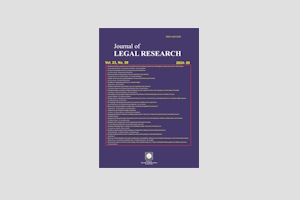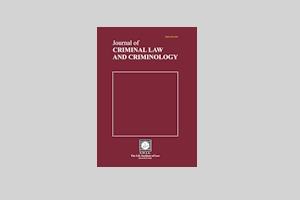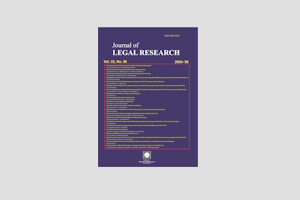Journal of
LEGAL RESEARCH
Number 23
Vol. XII ● No. 1
Spring – Summer 2013
Managing Editor: Vahid Eshtiagh
Editor-in-Chief: Seyyed Ghasem Zamani
CONTENTS
Articles
The Effect of Retrial on the Enforcement of Final Judgment
Fereidoon Nahreini (Ph.D.)
Seeking for Modern State in Iran: The Fate of Iranian Leviathan
Ali Akbar GORJI AZANDARIYANI (Ph.D.), Jafar SHAFIEI SARDASHT
International Responsibility of State in Cyber Attacks
Seyed Yaser ZIAEE (Ph.D.), Mona KHALILZADEH
Privacy Protection on Social Networking Sites
Bagher ANSARI (Ph.D.), Shima ATTAR
Nature of Honor Killings and approach of the Human Rights System towards them
Soheyla EBRAHIMI LOOYEH
Myanmar Crisis: A Test for UN Security Council in the context of International Legal Order
Fatemeh FATHPOUR, Marziyeh GHALANDARI
Developing Digital Libraries and the Fate of Copyright from the perspective of Comparative and International Law
Javad SHOJA, Elham Sadate ALVANKAR
What I learned from Legal Education System of England
Zoha ABDOLALIZADEH, Setareh SAEDI ARAGHI
Articles
The Effect of Retrial on the Enforcement of Final Judgment
Fereidoon Nahreini (Ph.D.)
Assistant Professor of Civil Procedure, Kish International Campus, University of Tehran
Abstract:
Retrial like other ordinary and exceptional ways of protest to award is a way which can have different impacts on the impugned final judgment, its pro_ proceedings and both parties based on its situations and legal act. One of these impacts is the effect of retrial on the process of the enforcement of award and can stay it. In other words the execution would be stopped through retrial. Stopping the execution of final judgment is subject to conditions such as transition from the first steps of proceeding in retrial and making an order to acceptance of retrial request. After issuing the acceptance of retrial, the impugned final judgment would be affected in the process of execution based on its being a financial or non-financial case. In case of non-financial affairs, the execution of award is stopped and for financial cases, the execution of award would be in process in case all the suitable security is paid by the judgment creditor in order to compensate the probable financial losses. If the financial compensation is not affordable at the discretion of the court or in case the winning Party is not able to pay the suitable security, the financial case would also be stopped.
Keywords: retrial, stay of execution, object of financial and non-financial judgment, order to acceptance of retrial.
Seeking for Modern State in Iran: The Fate of Iranian Leviathan
Ali Akbar GORJI AZANDARIYANI (Ph.D.)
Assistant Professor of Public Law, Shahid Beheshti University
Jafar SHAFIEI SARDASHT
Ph.D. Student in Public Law, Shahid Beheshti University
Abstract:
The state is the most central phenomenon of political society and considered the most important matter of public law so far as some believe they are both identical. Modern army, scientific progression, industrialization, economic development, and specially Westphalia Treaty, all had a very important role in the process of modern state emergence and made the grounds proper for it. Moreover, religious reform movement led by king, establishment of modern administration and bureaucracy, and the need to taxation for providing army and administration, played a basic role in state formation. With regard to above mentioned, the most important properties of modern state include monopoly control of the means of violence, territoriality, sovereignty, constitutionality, impersonal power, the public bureaucracy, authority/legitimacy, citizenship and taxation.
As witnessed by history, the emergence of modern state started with the transition from feudalism to absolutism. Therefore, absolutism was in response to dispersal of power resources towards centralized one. Absolutism then was the thesis that fosters its anti thesis within itself. Iranian absolute state in contrast to its European identical did not proceed from dispersal to centralization. At the outset, pre-modern state (absolute state) in Iran with respect of internal and external variables did move toward decentralization, rather than it should step toward power centralization then distributed it. As we know modern state was a structure that formed based on the European pattern on the field of the most progressive and the deepest social, economic and cultural developments; therefore having modern state entails the same circumstances and conditions. Finally, there is a cycle between basic natural state and mature one. So leviathan in today’s Iran is not a modern one and gets stuck between modernization and custom; so there is no clear way among the Islamic culture, ancient Iranian culture and western culture that is followed.
Keywords: Iran, modern state, open access order, pre-modern state, natural state, limited access order.
International Responsibility of State in Cyber Attacks
Seyed Yaser ZIAEE (Ph.D.)
Assistant Professor of International Law, University of Qom
Mona KHALILZADEH
LL.M. Student in International Law, IAU, Central Tehran branch
Abstract:
Cyber attacks are recognized as a new form of cyber interventions. Cyber attacks are targeting basic installations like governmental bank, energy, transportation systems which connected to cyber networks. Although cyber attacks aren’t kinds of use of force, aggression or armed attack but they are kinds of intervention in internal affairs of State which are a breach of international law. A state would be responsible if the attack attributes to that State. Cyber attack can be done by individuals who are employed by State and by Internet Service Provider Companies in to extent which these cyber attacks are done in public authority of that state. In this way it is necessary that that Draft Convention on International Responsibility of State be amended in relation to cyber attack requirements.
Keywords: cyber space, cyber attack, attribution of wrongful Act to a state, international responsibility, compensation.
Privacy Protection on Social Networking Sites
Bagher ANSARI (Ph.D.)
Assistant Professor of Media Law, Shahid Beheshti University
Shima ATTAR
Student of Master’s Degree in Communication Law, Allameh Tabataba’i University
Abstract:
Today social networking sites such as Face book, MySpace, and Twitter have found global fame and have become important part of a modern life. Millions of people throughout the world have joined these networks and share a great part of their information over these networks every day.
The information that users share on these networks could be misused by the providers of networks or third parties. For example, their private information could be disclosed in online environment or provided to companies for advertisement purposes, or used in other ways. Hence, these networks have become an easy platform of accessing the persons’ data and the personal data of users and some people associated with them in these networks are threatened.
To control these threats, attempts have been initiated in international and national levels but these attempts have not yet achieved favorable and reliable results. In our country, although threats from these networks have jeopardized security of some users, unfortunately the concerns over violating privacy by these networks or associated people are not yet a serious concern.
Hence, the present paper tires to explain the concept of social networking sites and the way they work (chapter 1), and then study the potential threats that may arise against privacy of people through membership in these networks, and the strategies for protection of people against these threats (chapter 2).
Keywords: social networking sites, privacy, personal data, cyber bullying.
Nature of Honor Killings
and approach of the Human Rights System towards them
Soheyla EBRAHIMI LOOYEH
LL.M. in International Law, Shahid Beheshti University
Abstract:
An honor killing is the homicide of a female member of a family by other male members of the same family, due to the belief of the perpetrators that the victim has brought dishonor upon the family. The perceived dishonor is normally the result of one of the following behaviors: refusing to enter into an arranged marriage, being the victim of a sexual assault, seeking a divorce, etc. Honor killings are labeled as a kind of violence against women. The first step to eliminate honor killings is to identify their nature as to three factors of gender, culture and religion. The study of England’s judicial precedents indicate that to consider so-called honor killings as a gender based violence would amount to a better protection of women. The augmentation in the rate of honor killings has invoked the international human rights system to respond. The 2002 UN resolution on the fight against honor killings could be mentioned as an example. Iran has also encountered the same issue for years. This justifies a brief study of Iran’s criminal justice system towards honor killings.
Keywords: honor killing, honor, sex, culture, violence.
Myanmar Crisis: A Test for UN Security Council
in the context of International Legal Order
Fatemeh FATHPOUR
LL.M. in International Law, Allameh Tabataba’i University
Marziyeh GHALANDARI
LL.M. in International Law, Allameh Tabataba’i University
Abstract:
In human Rights domain, Security Council should take in to consideration any issues which endanger International peace and security. The elegant link that is made by United Nation charter among maintenance of International peace and security and respect to Human Rights, as well, the ray of hope which is given by ICC statute composers to establishment of more justice have committed gruesome crimes against humanity, both create a legal basis for Security Council authority to refer the situation of countries which are not the ICC statute members.
Review of news, documents and reports which are released by UN special reporter and other International organs shows that systematic, extensive and sever crimes are happening in Myanmar.
Achievement to International peace is related to supplying justice and preventing of criminals, so by consideration of Security Council function in Darfur situation, it is expected that Security Council refer this serious situation to ICC.
Keywords: Myanmar crisis, authority of Security Council, maintenance of International peace and security.
Developing Digital Libraries and the Fate of Copyright
from the perspective of Comparative and International Law
Javad SHOJA
Master of Law, Researcher of Iranian National Center for Globalization Studies (INCGS)
Elham Sadate ALVANKAR
Master of Library and Information Science (MLIS)
Abstract:
Developing information technology has opened new legal aspects in protecting intellectual property rights in cyber space among which is infringement of copyright law by making unlimited number of copies of Literary and Artistic Works, available for thousands of users. Digital library as result of developed information technology, come up with copyright law in two parts: “digital acquisition” and “giving services and providing access” to digital content for library users.
Digital acquisition is usually done in two ways: one is digitalization of printed materials by scan or other technical ways and the other is that sources are originally selected, gathered and bought in digital format. About “giving access and services” digital libraries are similar to traditional libraries. The only different is that limitations of papers and accessibility are eliminated and digital sources are more flexible, easily copied and accessible for several users at the same time.
Explaining technical context of developing digital libraries, in this research issues and challenges that copyright law brings to the libraries are illustrated and finally the resolutions that legislators of USA, France, United Kingdome and Iran have for obstacles in developing digital libraries are investigated.
Consequences show that digitalization of libraries doesn’t open new pages of copyright law but the current law faces new issues in copyright. These issues can be resolved by adding digital concepts to statutory law. In fact there is no difference between the nature of law in digital and real environment but the supervision and performance of rules should be changed.
Keyword: library, digital library, intellectual property rights, copyright.
What I learned from Legal Education System of England
Zoha ABDOLALIZADEH
LL.M. in Advanced Legal Studies at University of Warwick and LL.B. in Law at Shahid Beheshti University
Setareh SAEDI ARAGHI
Attorney at Law, LL.M. in International Development Law and Human Rights at University of Warwick, LL.M. in International Law and LL.B. in Law at Allameh Tabataba’i University
Abstract:
Undoubtedly, the Western educational system, concerning it to be developed, is ahead from a developing country such as Iran, application of new educational models, enjoyment of rich library, and other facilities. This might be the most important reason for Iranian students at different majors to dream of studying in foreign universities in Europe, North America, and Australia. Other valuable advantages of studying in foreign schools are: training and enhancing the power of reasoning, discussion, critical thinking, and different personal and team skills. More particularly, the coursework studies and the student’s workload are more than of Iran, which help the student to empower his mind. This article pictures the educational system of law in England, while discussing its differences with Iranian legal education system and emphasizing on its positive points indirectly refers to adjustments in relation to promoting Iran’s legal education system. Indeed, the authors reflect on this issue through their experience of studying law at masters’ level at University of Warwick.
Keywords: educational system, legal education, legal research, Iran, England.





